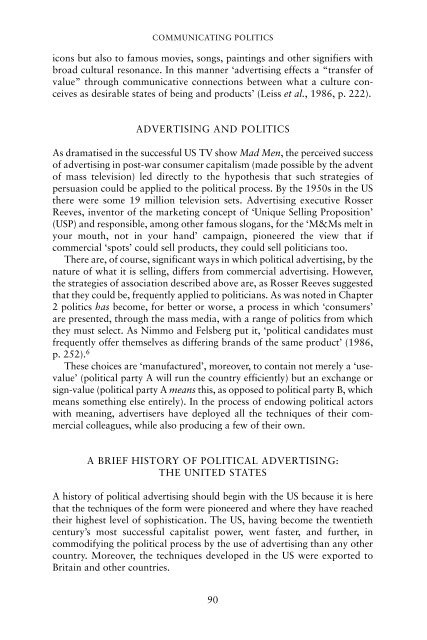20130412164339753295_book_an-introduction-to-political-communication
20130412164339753295_book_an-introduction-to-political-communication
20130412164339753295_book_an-introduction-to-political-communication
Create successful ePaper yourself
Turn your PDF publications into a flip-book with our unique Google optimized e-Paper software.
COMMUNICATING POLITICS<br />
icons but also <strong>to</strong> famous movies, songs, paintings <strong>an</strong>d other signifiers with<br />
broad cultural reson<strong>an</strong>ce. In this m<strong>an</strong>ner ‘advertising effects a “tr<strong>an</strong>sfer of<br />
value” through communicative connections between what a culture conceives<br />
as desirable states of being <strong>an</strong>d products’ (Leiss et al., 1986, p. 222).<br />
ADVERTISING AND POLITICS<br />
As dramatised in the successful US TV show Mad Men, the perceived success<br />
of advertising in post-war consumer capitalism (made possible by the advent<br />
of mass television) led directly <strong>to</strong> the hypothesis that such strategies of<br />
persuasion could be applied <strong>to</strong> the <strong>political</strong> process. By the 1950s in the US<br />
there were some 19 million television sets. Advertising executive Rosser<br />
Reeves, inven<strong>to</strong>r of the marketing concept of ‘Unique Selling Proposition’<br />
(USP) <strong>an</strong>d responsible, among other famous slog<strong>an</strong>s, for the ‘M&Ms melt in<br />
your mouth, not in your h<strong>an</strong>d’ campaign, pioneered the view that if<br />
commercial ‘spots’ could sell products, they could sell politici<strong>an</strong>s <strong>to</strong>o.<br />
There are, of course, signific<strong>an</strong>t ways in which <strong>political</strong> advertising, by the<br />
nature of what it is selling, differs from commercial advertising. However,<br />
the strategies of association described above are, as Rosser Reeves suggested<br />
that they could be, frequently applied <strong>to</strong> politici<strong>an</strong>s. As was noted in Chapter<br />
2 politics has become, for better or worse, a process in which ‘consumers’<br />
are presented, through the mass media, with a r<strong>an</strong>ge of politics from which<br />
they must select. As Nimmo <strong>an</strong>d Felsberg put it, ‘<strong>political</strong> c<strong>an</strong>didates must<br />
frequently offer themselves as differing br<strong>an</strong>ds of the same product’ (1986,<br />
p. 252). 6<br />
These choices are ‘m<strong>an</strong>ufactured’, moreover, <strong>to</strong> contain not merely a ‘usevalue’<br />
(<strong>political</strong> party A will run the country efficiently) but <strong>an</strong> exch<strong>an</strong>ge or<br />
sign-value (<strong>political</strong> party A me<strong>an</strong>s this, as opposed <strong>to</strong> <strong>political</strong> party B, which<br />
me<strong>an</strong>s something else entirely). In the process of endowing <strong>political</strong> ac<strong>to</strong>rs<br />
with me<strong>an</strong>ing, advertisers have deployed all the techniques of their commercial<br />
colleagues, while also producing a few of their own.<br />
A BRIEF HISTORY OF POLITICAL ADVERTISING:<br />
THE UNITED STATES<br />
A his<strong>to</strong>ry of <strong>political</strong> advertising should begin with the US because it is here<br />
that the techniques of the form were pioneered <strong>an</strong>d where they have reached<br />
their highest level of sophistication. The US, having become the twentieth<br />
century’s most successful capitalist power, went faster, <strong>an</strong>d further, in<br />
commodifying the <strong>political</strong> process by the use of advertising th<strong>an</strong> <strong>an</strong>y other<br />
country. Moreover, the techniques developed in the US were exported <strong>to</strong><br />
Britain <strong>an</strong>d other countries.<br />
90
















